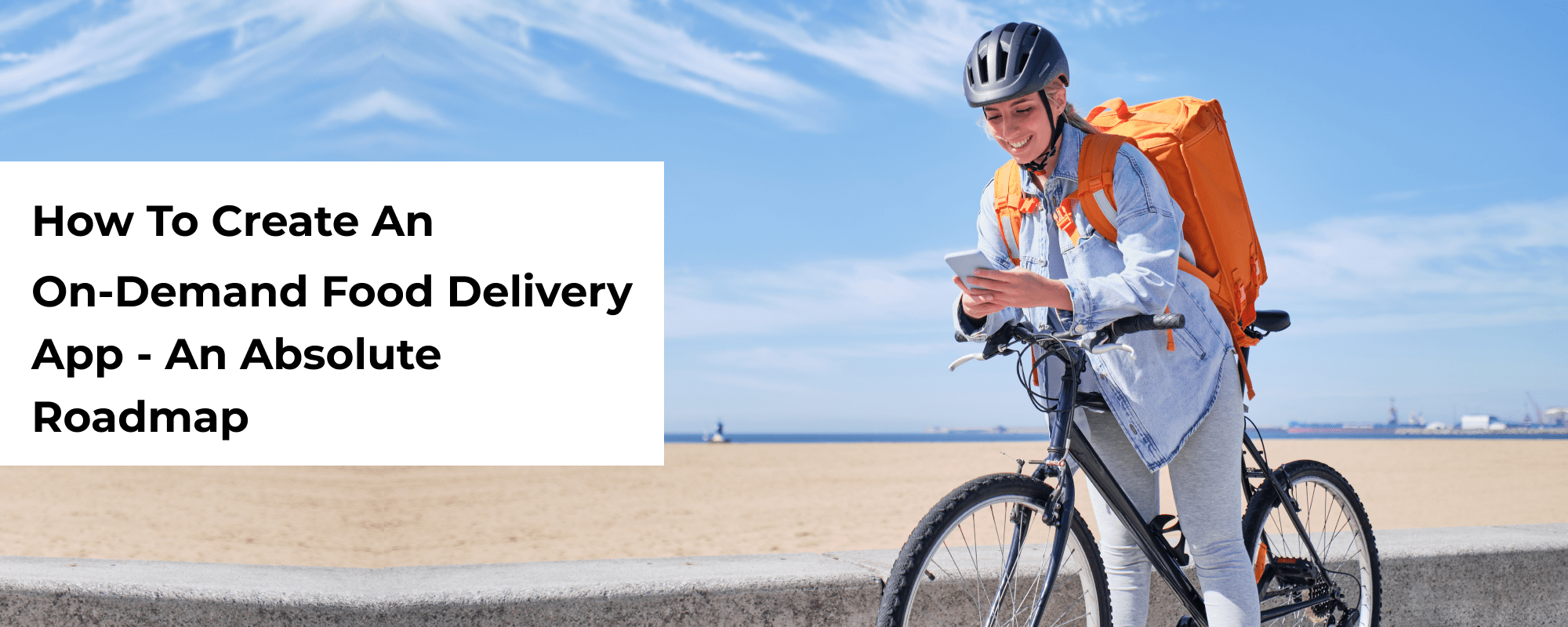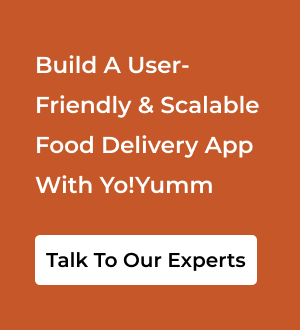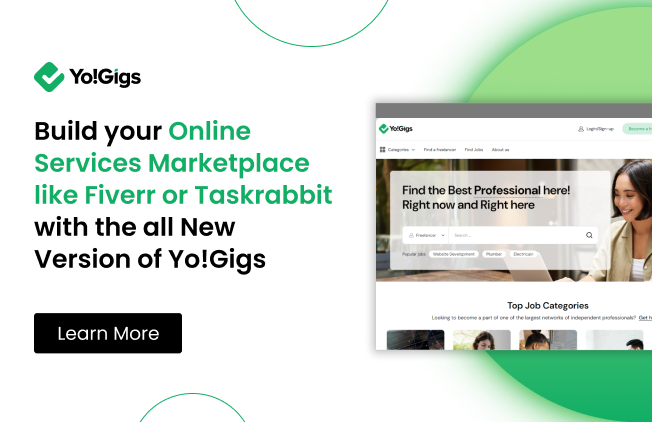The online food delivery industry has seen unprecedented growth in the last few years. As people are increasingly looking for ways to get their meals conveniently, especially with busy working schedules and lifestyles, the demand for on-demand food delivery has increased expeditiously. Moreover, by 2029, the food delivery industry is anticipated to reach $320 billion, offering many lucrative opportunities for budding entrepreneurs.
It is indeed the right time for entrepreneurs to leverage this growth opportunity by building an online food delivery platform and being part of this multi-billion industry. For building your food delivery app you need to have knowledge of various aspects essential for building a successful app. Hence, in this article, we will take you through the steps and everything else you need to know about on demand food delivery app development.
Table of Contents:
Benefits of Creating an On-Demand Food Delivery App For Entrepreneurs
There are numerous benefits of an on-demand food delivery app for entrepreneurs who want to establish themselves in the food delivery industry. Some of them include:
– A wide user base
– Multiple revenue streams
– Diverse marketing channels
– Easy management
– Actionable data and analytics
These were some of the benefits entrepreneurs can avail of with an on-demand food delivery app.
Exploring the success of popular online food delivery platforms can provide you with invaluable insights into the online food delivery industry. Therefore, in the next section, we comprehensively analyze the key players in the market and their growth journey.
Key Players in the Industry
Let’s take a look at the top players in the online food delivery industry.
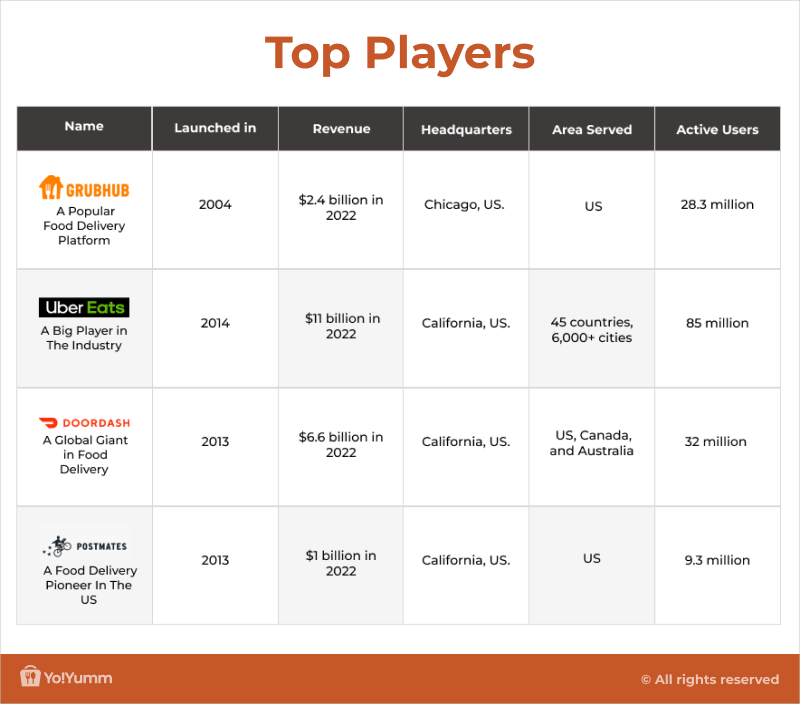
Uber Eats – A Big Player in The Industry
Uber Eats is one of the most popular food delivery platforms with more than 85 million users. This platform connects customers with a wide array of local restaurants offering multiple cuisines in one place. Uber Eats is available in several countries including Australia, Germany, Japan, Canada, and many more.
Launched in – 2014
Revenue – $11 billion in 2022
Headquarters – California, US.
Area Served – 45 countries, 6,000+ cities
Active Users – 85 million
DoorDash – A Global Giant in Food Delivery
DoorDash is a leading food delivery platform that partners with local restaurants and food entrepreneurs enabling them to deliver diverse food options to consumers. The food delivery platform is based in the United States and is a big name in several countries around the world. DoorDash serves around 4,000 cities across the US, Canada, and Australia.
Launched in – 2013
Revenue – $6.6 billion in 2022
Headquarters – California, US.
Area Served – US, Canada, and Australia
Active Users – 32 million
Postmates – A Food Delivery Pioneer In The US
Postmates is a US-based delivery app that offers its services in around 4000+ cities across the US. This food delivery app offers services in food, drinks, groceries, and more. Around 600,000 restaurants partner with Postmates to provide their services to customers.
Launched in – 2013
Revenue- $1 billion in 2022
Headquarters – California, US.
Area Served – US
Active Users – 9.3 million
Grubhub – A Popular Food Delivery Platform
Grubhub is a prominent food delivery platform serving thousands of food enthusiasts across 4000+ cities in the US. This platform partners with more than 365,000 restaurants and works on a commission-based revenue model. Additionally, Grubhub offers advertising opportunities to restaurant partners to help them attract customers.
Launched in – 2004
Revenue – $2.4 billion in 2022
Headquarters – Chicago, US.
Area Served – US
Active Users – 28.3 million
As you can see, there are several players in the food delivery industry that are flourishing. By understanding your competitors and what is their unique value proposition, you can create a better-equipped food delivery platform of your own.
Now that you have a better understanding of the key players in the industry, next, let’s analyze the working of a food delivery app.
How an On-demand Food Delivery App Works
By having an in-depth understanding of the working of an on-demand food delivery platform, you can better plan and create an online food delivery app that meets the needs of your target audience. Let’s understand how a food delivery app works.
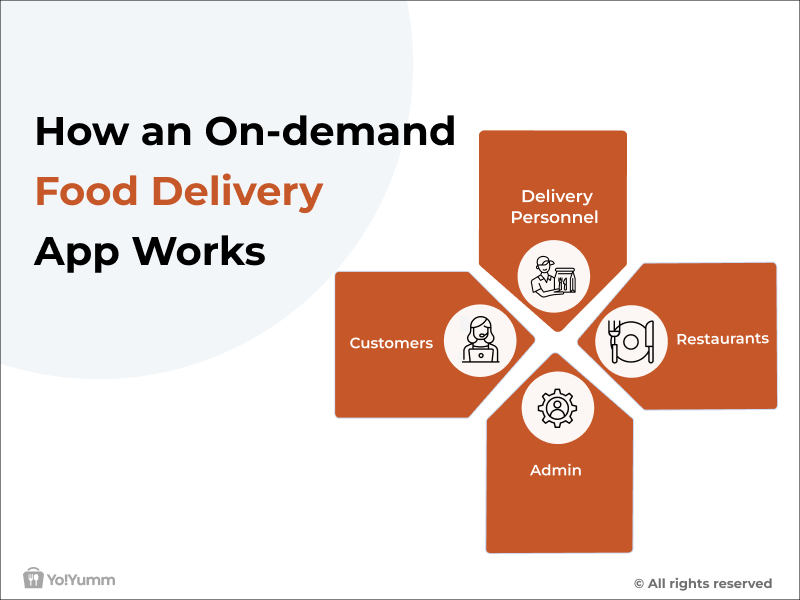
Customers
Customers browse through the listed food items/restaurants on the platform or can search based on their location, cuisine names, keywords, and more. Once they select the food item, they enter their delivery address, make payment, and confirm their order.
Restaurants
Restaurants register themselves on the food delivery platform by providing the necessary information. They receive orders, manage their menus, set up the price, and others through the platform. In addition, restaurants can also view sales reports, analytics, customer ratings, and reviews on the app.
Delivery Personnel
Delivery personnel use the app to receive and manage orders. They can view the details of the orders along with customers’ addresses, estimated delivery times, and navigation routes.
Admin
The admin is responsible for managing the entire platform and the users. Business owners can streamline the management of user accounts, restaurant registrations, delivery personnel, and customers. The admin can also track orders, revenue, customer feedback and many more at one place. Additionally, an admin can view reports and analytics to analyze the growth and performance of their business.
Power Your Food Delivery Business With Extensive Admin Features
Going forward, let’s see in detail the steps to build an on-demand food delivery app. In this section, we will explore various aspects of building an online food delivery platform from idea curation to launch. These steps will help you develop a robust and scalable food delivery app to kick-start your online food delivery business.
Steps For On-Demand Food Delivery App Development
Building an online food delivery app could be a complex task to begin with, however, by following a step-by-step approach as mentioned below, you can simplify the process and ensure a successful launch of your online food delivery app.
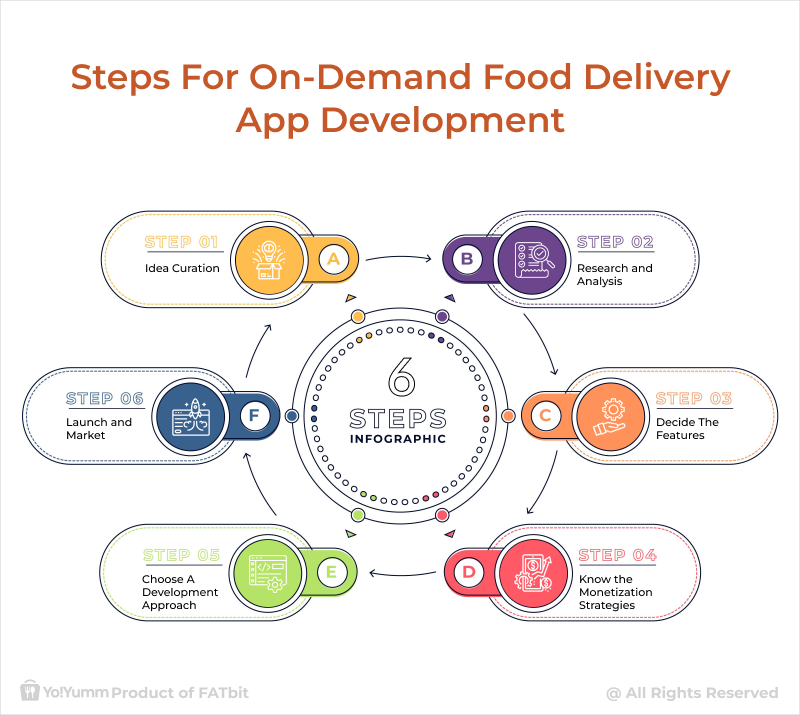
Step 1 – Idea Curation
The first step in on-demand food delivery app development is to have a better understanding of your business idea and vision. This can be achieved by identifying the pain points of your target audience. Once identified, you can brainstorm ideas for how to address those pain points through your online food delivery app. This might involve offering an intuitive user interface, the best features to users, and more.
Step 2 – Research and Analysis
Once you have defined your idea, the next step before launching any business is to assess the demand in the industry. It is essential to conduct thorough research and analysis of the industry to identify potential opportunities and challenges that you might face in the future. In addition to that, you must also study your competitors, learn from their weaknesses and strengths, analyze market trends and demands, and identify legal considerations if there are any. Proper research can help you make a reliable and robust food delivery app.
Step 3 – Decide The Features
After doing proper research and analysis, the next step is to know about the essential features that you must integrate into your food delivery app to make it a success. To make your on-demand food delivery app stand out in this hyper-competitive online food delivery industry, you must consider integrating popular features that can cater to the needs of users on your platform.
Features of a food delivery app can be divided into several categories, some of which include:
| Order and Menu Browsing |
Real-time Tracking |
Feedback and Communication |
Security |
Loyalty Program |
Management |
| Advanced search filters |
GPS |
Ratings and reviews |
Secure login and registration |
Discounts and cashback offers |
Profile management features |
| List of recommendations |
Route 0ptimisation |
Customer support via live chat, emails, phone and more |
Secure multi-
payment options |
Loyalty and reward points |
Restaurant management features |
| Location-based search |
Instant order status update |
|
SSL Compliance |
|
Delivery management features |
| Keyword, cuisine, restaurant-based search |
Quick notifications and alerts |
|
GDPR Compliance |
|
Order management features |
| User-friendly interface |
Real-time order tracking |
|
|
|
Dedicated Dashboards |
| Easy navigation |
Estimated time of delivery |
|
|
|
Admin Panel |
|
|
|
|
|
Marketing & SEO Management |
Build a Feature-Rich Food Delivery Platform
After clearly understanding the features that make an online food delivery platform successful, let’s explore the monetization strategies that can help you turn your food delivery platform into a profitable business venture.
Step 4 – Know the Monetization Strategies
The food delivery industry is not only rapidly expanding, but also is highly lucrative. Take a look at these numbers– Uber Eats generated a revenue of $11 billion in 2022, surpassing the revenue of $8.3 billion earned in 2021, whereas, DoorDash earned a revenue worth $4.5 billion in 2021, which was almost double the previous year’s revenue. In 2022, DoorDash’s revenue increased even more to reach $6.6 billion.
The reason behind such success is multiple monetization strategies implemented by the major on-demand food delivery platforms. Here, we list the most popular revenue streams for an online food delivery platform.
Commission fee
Platform owner can charge a percentage of the fee from the restaurants out of the total order value placed through their on-demand food delivery app.
Delivery fee
A delivery fee can be charged by the platform from customers for delivering orders to their doorsteps.
Advertising fee
Platform owner can also generate revenue through advertising. They can offer push notifications, and in-app ads to restaurants and other businesses interested in reaching out to a wider customer base, in return for an advertising fee.
Featured Listing
Platform owner can offer sponsored listings to restaurants. They can appear at the top of the search results, on the app’s homepage, or on any other prominent location on the platform. This helps restaurants boost their visibility and eventually increase their revenue.
Paid passes
Paid passes are relatively a new monetization strategy implemented by some of the popular online food delivery platforms. For example, DoorDash provides its customers DashPass for a monthly or annual fee which offers a $0 delivery fee and exclusive discounts to customers throughout the subscription period. This is an attractive revenue stream as it provides a predictable source of recurring revenue.
It is always recommended to opt for multiple monetization strategies to maximize your revenue opportunities, hence, you can choose relevant revenue streams depending on your business goals.
After deciding on the revenue streams, now comes the most crucial step which is to choose a reliable software to build and launch your online food delivery platform. With multiple options available in the market, it can be overwhelming to determine which solution could be the best fit for your business needs. However, we have gathered all the relevant information to help you make an informed decision.
Step 5 – Choose A Development Approach
There are majorly two development approaches prevalent in the industry for on-demand food delivery app development. The first option is to custom-develop your platform from scratch. For this, you would need to hire a team of developers, designers, and technical experts who could build the platform for you. This development process is time-consuming and can take from a few months to years to actually let you launch your food delivery platform.
Another option is to opt for a ready-made software solution. Ready-made software are off-the-shelf solutions that can help you launch your food delivery platform hassle-free. Here, you need not have any technical expertise and you can just pick a suitable software based on your business needs and can launch your business in quick time. Efficient ready-made software comes pre-integrated with essential features and functionalities required to seamlessly run an online food delivery business.
Step 6 – Launch and Market
The last and final step is to launch your online food delivery platform in the market and promote it. You can make a good marketing strategy to promote your app and attract more users to your platform.
Launch Your Food Delivery Business With Our Ready-Made Software
By following these steps you can easily develop and launch your online food delivery platform. Now, you must be wondering, how much it is going to cost you to build an on-demand food delivery app. We have tried to answer that question for you in the next part.
Development Cost Of An On-demand Food Delivery App
The cost of developing an on-demand food delivery app will depend on the development approach you have chosen to launch your platform. Ready-made software is a more cost-effective option and costs you around three times less as compared to custom development.
Moreover, the cost will also depend on factors such as complexity, customizations, technology stack, API integration, platform’s features & functionality, and more.
How Yo!Yumm Can Help You In Launching A Successful On-Demand Food Delivery App
Yo!Yumm, a readymade food delivery software by FATbit Technologies can help you in launching your online food delivery platform hassle-free. It is an efficient software solution that can take care of all needs of an online food delivery business. It enables entrepreneurs to easily optimize and streamline their business operations.
Yo!Yumm is best described as an all-inclusive solution for your online food delivery business needs. Most importantly, this software offers advanced features to smoothly run an online food delivery platform.
Here are some of the features offered by Yo!Yumm that can help you build the best on-demand food delivery app.
- One-year free customer support
- Lifetime ownership with no recurring charges
- Complete control over appearances and feel of your online platform
- Actionable data and analytics
- Pre-integration of popular APIs
- Offers intuitive mobile apps and websites
Want To Understand How Yo!Yumm Can Work For Your Online Food Delivery Business
Conclusion
The development of an on-demand food delivery app opens up endless possibilities for entrepreneurs in the online food delivery industry. Creating the right food delivery app with all reliable features is extremely important for the sustainable growth of any business. By following the comprehensive guide we have provided, you now have a solid understanding of the considerations involved in creating a successful food delivery app. With careful planning and the right software solution, an online food delivery platform can be created hassle-free.
